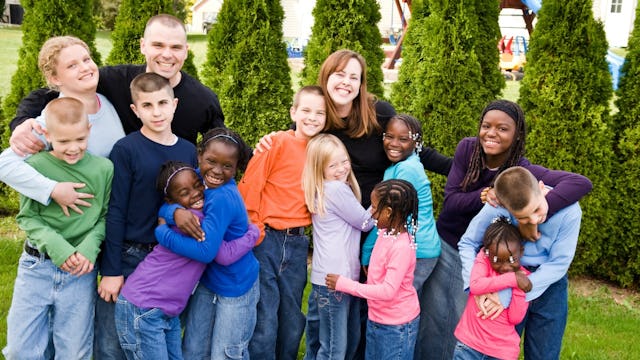Adopting A Child Internationally? This Is Something to Be Aware Of

Families are created in a number of amazing ways, and one of those ways is adoption. Some people choose to adopt domestically in an open adoption; others adopt through the foster care system; and others adopt internationally. In most international adoption cases, the children are legally adopted through an arduous, extensive process after their biological parents have surrendered their parental rights or died.
But in some cases, unscrupulous people take advantage of the system, to the detriment of the innocent children.
A CNN story recently highlighted a harsh reality about the dangers of adopting internationally, particularly in countries with high rates of poverty or those that have been ravaged by war. In these countries, families can be deceived into unwillingly signing away their parental rights.
Take, for instance, 7-year-old Mata’s mother, who was told she was temporarily sending her daughter to the United States for an education, but was tricked into relinquishing her parental rights. She was led to believe she would be able to maintain contact with her child, and that she would eventually return home.
The birth parents are typically told one story by the agency representatives, who then tell the adoptive parents something completely different. Wanting their children to have access to better opportunities, such as an education, these birth parents are under the impression that their children will be returned to them after a temporary stay in the United States. Often the parents are impoverished, and many of them are widows with multiple children. Preyed upon by corrupt people looking to make a buck, and without reading (or understanding) the fine print, these parents unknowingly and unwillingly sign over their parental rights.
Once the birth parents are out of the picture, the agencies then dupe well-intentioned adoptive parents into believing that these kids were willingly surrendered. Because people in the home country may be paid a fee for every child they can turn over for adoption, the incentive for corruption is high. In fact, teachers, religious leaders, cops, and even neighbors may be working for these agencies. The adoptive parents are told that the children have been neglected by their families or that their parents died.
With documents to back up the agency’s “story,” the adoptive parents have no idea they are part of a scheme. They have no idea that the children may have been taken from happy, loving homes. They are victims of the corruption too.
It’s only once the adopted child begins to share their story — if they are even old enough to remember it — that the adoptive parents realize that maybe, just maybe, something wasn’t on the up and up. Once adoptive parents do realize that something is amiss, they are then faced with the gut-wrenching task of reporting their concerns and working to set things right.
To combat the trauma of unethical and illegal adoptions, certain groups work with families to make sure the children are placed back with their birth families as quickly and seamlessly as possible. But the process is not without challenges, of course.
If a child has been taken from their family at a young age and doesn’t remember their birth family, establishing a relationship may be particularly difficult. And in some cases, the adoptive parents are reluctant to return the children they’ve loved and raised as their own to their families. Since neither the birth family or adoptive family is at fault, and both want what’s best for the child, coming up with a solution can sometimes be difficult and the reunification process can take time.
In Mata’s case, she was happily reunited with her birth mother.
So what can adoptive parents do to ensure that an international adoption is ethical and legal? Well, first, they should seek out a reputable adoption agency, and then do their due diligence. Ask questions and get recommendations. And if they notice anything questionable, speak up and report the situation immediately.
As more and more stories surface about unethical and illegal adoptions, the corrupt agencies are being shut down, but there is still a lot of work to be done to dismantle this system. This is not intended to discourage folks from adopting children. Adoption is an amazing, beautiful way to make or complete a family. But we need to be mindful of this issue as we move forward and work to make sure that children like Mata are not torn away from their loving homes.
This article was originally published on